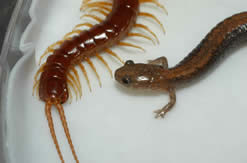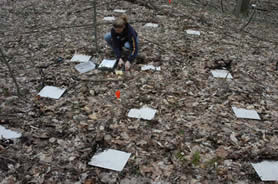Doctor of Philosophy (PhD)
CARI HICKERSON, Class of 2000


A SUMMARY OF MY DOCTORAL RESEARCH
My PhD work examines interactions among organisms occupying multiple trophic positions in deciduous forest floor food webs. Specifically, my work addresses how competitive interactions and intraguild predation among large predators of the forest floor system affect the abundance and distribution of these organisms and on organisms occupying other trophic levels. I focus on interactions among taxonomically divergent forest floor predators (salamanders, centipedes, spiders and beetles) using a combination of field and laboratory experiments. Laboratory experiments test interactions among predators and focus on intraguild predation, aggression and interspecific territoriality. My field work is conducted in the Cuyahoga Valley National Park in northeast Ohio where I have a long term predator removal site established to examine the effects of predator abundance on lower trophic levels within the web. I measure changes in the densities of intraguild predators, macrodetritivores, mesofauna, microbes and rates of leaf litter decomposition in removal treatments compared to controls.
---------------------------------------------------------------------------------
My advice to undergraduates interested in pursuing a PhD
My advice is straight forward. There are few key things that you can do to effectively land an assistantship in a PhD program and to effectively prepare for a career in academia.
1. Start early. Get involved in undergraduate research if possible. Undergraduate research may provide you with your first experience actually doing science! This is extremely valuable because it provides you with some understanding of hypothesis formation, experimental design, data collection, analysis and presentation. Who knows it may be an opportunity for you to get your first peer reviewed publication in a scientific journal! That’s not all; your undergraduate research mentor will be one of the most important advocates for you when applying to graduate school.
2. When applying to a program choose an advisor, not a program or a university. I think this step is an important one that gets neglected by many students. Remember that your decision to go to graduate school should be based on the fact that you have an interest in some specific area of research that you have discovered along the way. This leads me to my next bit of advice.
3. READ, READ, READ!!!!! The idea here is that you find an area of interest and then read papers by the researcher(s) conducting the research. Then you should check out their web page. Most faculty research pages will have a summary of current work going on in the lab, lists and contact information for current and past graduate students and some will include publications or their CV online as well. Looking over this material can be useful. For example, if you notice that the last publication the researcher has was published 15 years ago that might be a red flag. It could mean that they are no longer research active, or that they are no longer taking students or maybe the website is really outdated so you may want to look elsewhere.
4. The next step is to contact the potential advisor by writing them a letter stating your interest in the lab before you apply to the program. You really want the connection with your graduate advisor to be solid before you apply because this person can go to bat for you if they really want to work with you. The letter is a crucial part of the process and in it you need to ask if the potential advisor is accepting students, tell them a bit about yourself and most importantly, you have to convince them that you are interested in their work and that you will be a productive student in the lab. Be sure to have someone proof and comment on your letter before send it!
If you are interested in ecology and/or evolution I would suggest getting a MS before entering into a PhD program. To me having a MS is advantageous because it will give you at least one publication (and maybe up to 2 or 3) before you even start you PhD and it is great preparation for a PhD. You’ll already know what to do and things will be less intimidating for you when you start your PhD program. You will be able to focus on your research more quickly with a MS under your belt!
Also, publish along the way. Try to get a paper out a year while in grad school. Trust me you will need them to get a good job! You don’t want to be left at the end of 4 or 5 years of data collection with an entire dissertation to write up!
Finally, the best advice I ever got as an undergraduate preparing to go off to graduate school was this: “Do a project that your advisor suggests, because he/she knows what is doable better than you do.”
